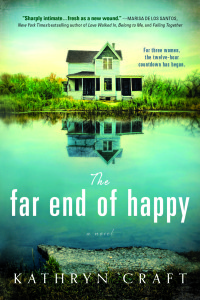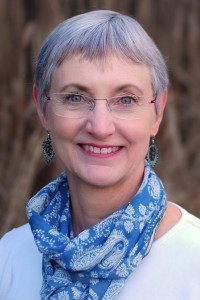 Our latest book club pick is the riveting THE FAR END OF HAPPY by Kathryn Craft (Out May 5th) based on a real event that happened in Kathryn's life.
And we have one copy for giveaway. Just leave a comment to be entered. Contest closes Thursday, April 23rd at 8pm PST.
Our latest book club pick is the riveting THE FAR END OF HAPPY by Kathryn Craft (Out May 5th) based on a real event that happened in Kathryn's life.
And we have one copy for giveaway. Just leave a comment to be entered. Contest closes Thursday, April 23rd at 8pm PST.
The scoop: Ronnie's husband is supposed to move out today. But when Jeff pulls into the driveway drunk, with a shotgun in the front seat, she realizes nothing about the day will go as planned.
The next few hours spiral down in a flash, unlike the slow disintegration of their marriage-and whatever part of that painful unraveling is Ronnie's fault, not much else matters now but these moments. Her family's lives depend on the choices she will make-but is what's best for her best for everyone?
Our thoughts: A chilling, page-turner. One that will stay with you for a long time.
Liz & Lisa's Book Club: The Far End of Happy by Kathryn Craft
 THE FAR END OF HAPPY is based on a true event from your life. What prompted you to want to fictionalize your personal story?
THE FAR END OF HAPPY is based on a true event from your life. What prompted you to want to fictionalize your personal story?
At first I just wanted to jot down the facts pertaining to my first husband’s 1997 suicide before memory scrambled them. After writing an unrelated first novel, I drafted what I thought would be a memoir about my first marriage, its horrific end, and how my sons and I moved on. It was a healing exercise to tame the chaos of that time into manageable arcs with beginnings, middles, and ends.
While moving on to a second novel I continued to work on the memoir but no matter what chapter I was working on my thoughts kept snapping back to the day of the standoff, and how my knowledge that it was coming colored my perceptions. The best way to convey this effect, I started to think, would be to constrain the novel to its twelve hours.
To suggest my main character’s story arc and explore the standoff’s effect on others, I’d have to use more than one point of view and compress the timeline of true events so that more could happen on that one day. The challenge of doing so refreshed my interest in revisiting this difficult material.
But now that I’ve worked on framing my experience both ways, I can see that both memoir and fiction rely on the power of story to reveal universal truths. They are simply alternate routes to the same destination.
The cover for THE FAR END OF HAPPY is gorgeous. What’s the story behind it?
Isn’t it? The Sourcebooks design team is amazing. I didn’t think they could top my cover for THE ART OF FALLING—and then I found this in my in-box. It was perfectly conceived, with that lovely old farmhouse on the shore and the creepy, broken-down one reflected in the water. There is no pond or lake in the book so that was simply a stroke of cover art genius, as many things aren’t as they seem to be in the story. The Interlude Group loved it so much they used it as the basis of my trailer.
You talk a lot about the importance of authors connecting with and supporting one another and you host writing retreats for women. How has this helped enhance your own writing process?
I discovered long ago that I am a socially motivated person, and that I will often do for others what I won’t do for myself (case in point: make nutritious dinner if my husband is home, eat popcorn on the fly if it’s just me). I’ve used that self-awareness to my advantage, and have found a way to live a pretty social life, for an endeavor that must be pursued alone. For several years I’ve met every Wednesday with a group of other writing women in the café of a local grocery store to write. It’s a kind of witnessing, I guess, tapping away on our computers all morning and then solving problems and sharing tips over lunch. If it weren’t for my winter Craftwriting workshops and summer writing retreats I would never force myself to write from prompts, which stretch me to think about craft anew.
As for my many years of leadership in the writing community, that was a carry over from my dance life: without volunteers, the arts world would quit turning and we’d all fall off. It’s always been that way and will continue to be that way—each of us stands in a lineage between our own mentors and those behind us to whom we offer a hand. When you volunteer to keep a writing community going, you bring quality teachers to yourself while creating paying gigs for authors. If you support those authors and buy their books you are ensuring the health of the industry you hope will support you.
And voila! You have a network. People who know someone who knows someone who can help you one way or another. A street team invested in your success. I’m even in a marketing cooperative of women’s fiction writers, the Tall Poppy Writers. To go it alone these days is like being a guppy in an ocean of killer whales. We become more powerful when we band together. A fun exercise to do is to list how many “communities” you are a part of. The longer the list, the farther your reach.
What is something your fans might be surprised to find out about you?
Um—that this is the first time I heard I had fans? Readers may be surprised to know that I studied Russian for seven years, simply because I was fascinated to learn another alphabet. I even majored in it for a year in college, but after reading the memoir by ballet dancer Valery Panov, that detailed all the grievous mayhem the KGB imposed on him for fear that he and his wife would defect, I was too afraid to ever think of traveling to the USSR. I loved college. I would declare five more majors before getting a bachelors in biology and a masters in health and phys ed, but never ended up working in fields that required either degree.
Thanks, Kathryn!
